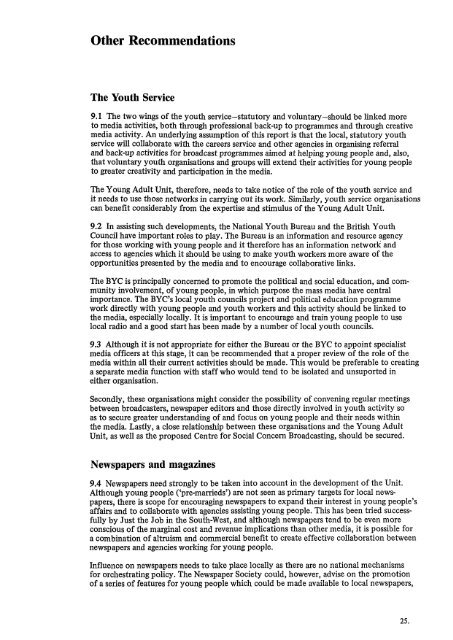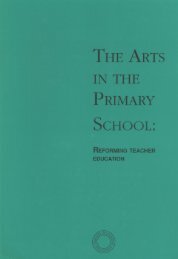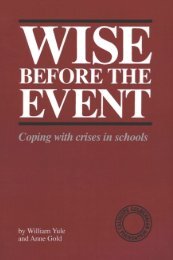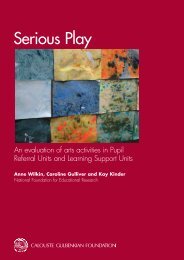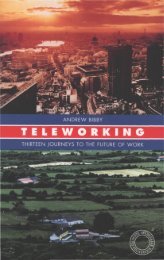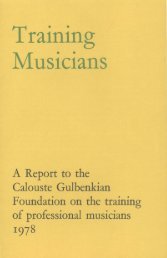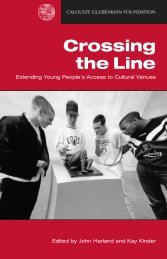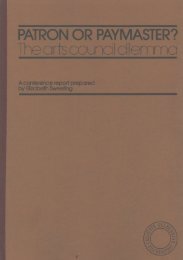Young People and Broadcasting - Calouste Gulbenkian Foundation
Young People and Broadcasting - Calouste Gulbenkian Foundation
Young People and Broadcasting - Calouste Gulbenkian Foundation
Create successful ePaper yourself
Turn your PDF publications into a flip-book with our unique Google optimized e-Paper software.
Other Recommendations<br />
The Youth Service<br />
9.1 The two wings of the youth service—statutory <strong>and</strong> voluntary—should be linked more<br />
to media activities, both through professional back-up to programmes <strong>and</strong> through creative<br />
media activity. An underlying assumption of this report is that the local, statutory youth<br />
service will collaborate with the careers service <strong>and</strong> other agencies in organising referral<br />
<strong>and</strong> back-up activities for broadcast programmes aimed at helping young people <strong>and</strong>, also,<br />
that voluntary youth organisations <strong>and</strong> groups will extend their activities for young people<br />
to greater creativity <strong>and</strong> participation in the media.<br />
The <strong>Young</strong> Adult Unit, therefore, needs to take notice of the role of the youth service <strong>and</strong><br />
it needs to use those networks in carrying out its work. Similarly, youth service organisations<br />
can benefit considerably from the expertise <strong>and</strong> stimulus of the <strong>Young</strong> Adult Unit.<br />
9.2 In assisting such developments, the National Youth Bureau <strong>and</strong> the British Youth<br />
Council have important roles to play. The Bureau is an information <strong>and</strong> resource agency<br />
for those working with young people <strong>and</strong> it therefore has an information network <strong>and</strong><br />
access to agencies which it should be using to make youth workers more aware of the<br />
opportunities presented by the media <strong>and</strong> to encourage collaborative links.<br />
The BYC is principally concerned to promote the political <strong>and</strong> social education, <strong>and</strong> community<br />
involvement, of young people, in which purpose the mass media have central<br />
importance. The BYC's local youth councils project <strong>and</strong> political education programme<br />
work directly with young people <strong>and</strong> youth workers <strong>and</strong> this activity should be linked to<br />
the media, especially locally. It is important to encourage <strong>and</strong> train young people to use<br />
local radio <strong>and</strong> a good start has been made by a number of local youth councils.<br />
9.3 Although it is not appropriate for either the Bureau or the BYC to appoint specialist<br />
media officers at this stage, it can be recommended that a proper review of the role of the<br />
media within all their current activities should be made. This would be preferable to creating<br />
a separate media function with staff who would tend to be isolated <strong>and</strong> unsuported in<br />
either organisation.<br />
Secondly, these organisations might consider the possibility of convening regular meetings<br />
between broadcasters, newspaper editors <strong>and</strong> those directly involved in youth activity so<br />
as to secure greater underst<strong>and</strong>ing of <strong>and</strong> focus on young people <strong>and</strong> their needs within<br />
the media. Lastly, a close relationship between these organisations <strong>and</strong> the <strong>Young</strong> Adult<br />
Unit, as well as the proposed Centre for Social Concern <strong>Broadcasting</strong>, should be secured.<br />
Newspapers <strong>and</strong> magazines<br />
9.4 Newspapers need strongly to be taken into account in the development of the Unit.<br />
Although young people ('pre-marrieds') are not seen as primary targets for local newspapers,<br />
there is scope for encouraging newspapers to exp<strong>and</strong> their interest in young people's<br />
affairs <strong>and</strong> to collaborate with agencies assisting young people. This has been tried successfully<br />
by Just the Job in the South-West, <strong>and</strong> although newspapers tend to be even more<br />
conscious of the marginal cost <strong>and</strong> revenue implications than other media, it is possible for<br />
a combination of altruism <strong>and</strong> commercial benefit to create effective collaboration between<br />
newspapers <strong>and</strong> agencies working for young people.<br />
Influence on newspapers needs to take place locally as there are no national mechanisms<br />
for orchestrating policy. The Newspaper Society could, however, advise on the promotion<br />
of a series of features for young people which could be made available to local newspapers,<br />
25.


